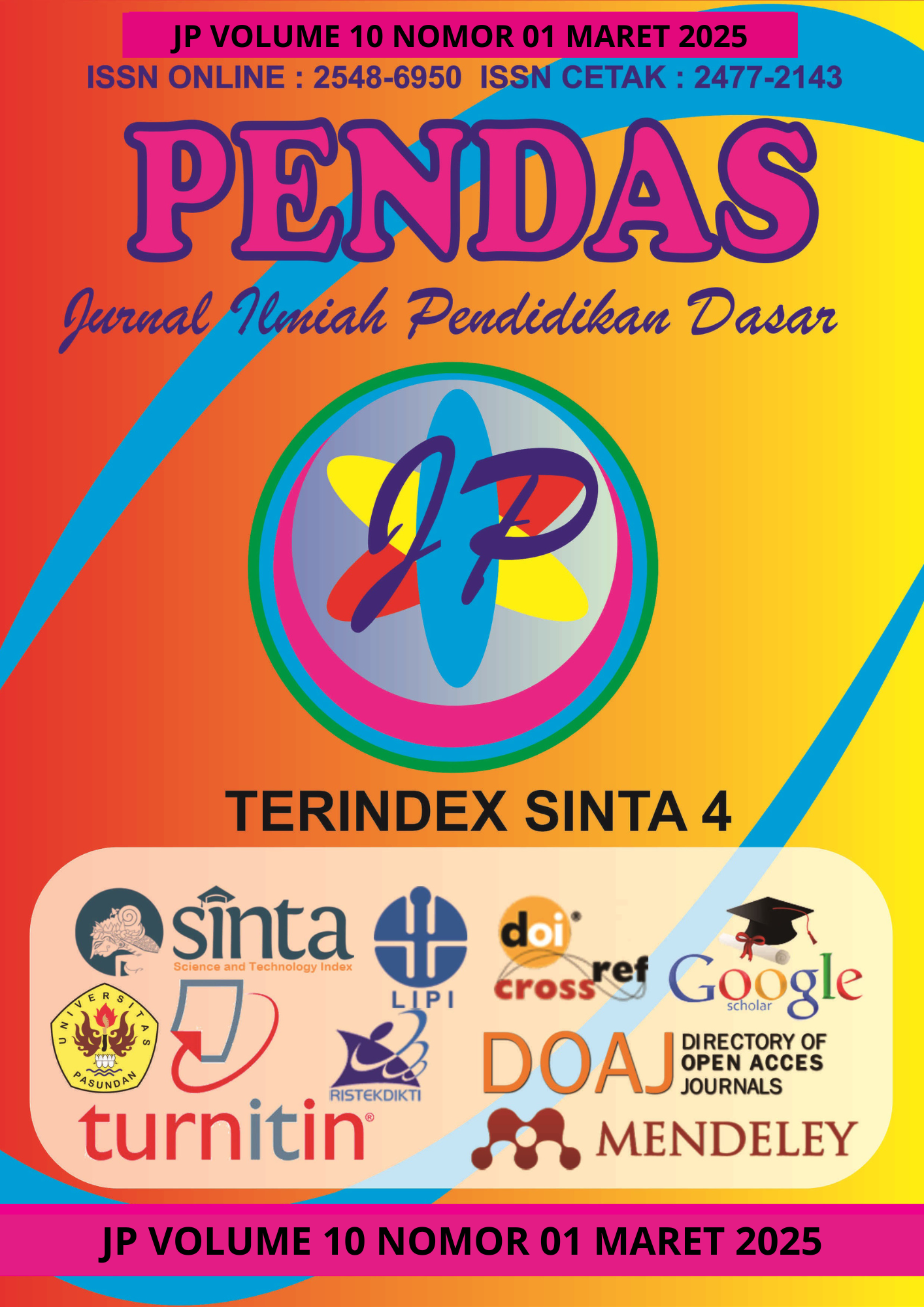INTEGRASI ILMU DAN AGAMA: PERSPEKTIF ISLAM DALAM ONTOLOGI, EPISTEMOLOGI, DAN AKSIOLOGI ILMU PENGETAHUAN
DOI:
https://doi.org/10.23969/jp.v10i01.22392Keywords:
integration, islam, philosophyAbstract
This article aims to explore the integration between science and religion in the context of Islam, focusing on three main aspects of the philosophy of science: ontology, epistemology, and axiology. The scope of the research includes the analysis of the relationship between scientific knowledge and Islamic teachings, as well as the development of educational models that integrate the two aspects. The method used is a qualitative approach through library research, which involves the analysis of Qur'anic texts, Hadiths, and classical works of scholars. The results of this study show that the integration of science and religion can enrich human understanding of reality and provide a clear direction in the development of ethical science. This study finds that the bayani, burhani, and irfani approaches complement each other in building a holistic science paradigm. The conclusion of this study confirms that the separation between science and religion must be avoided, as they are both integral parts of the search for truth. Thus, Islamic religious education (PAI) needs to play an active role in bridging these two fields to produce a generation that is intellectually intelligent and morally wise.
Downloads
References
Abubakar, A., & Ridha, A. (2024). AL-QUR’AN DAN KECERDASAN BUATAN (SUATU KAJIAN TEMATIK). AL-WAJID: JURNAL ILMU AL-QURAN DAN TAFSIR, 5(2).
Al Farizi, M. (2024). ALQUR’AN DAN ISLAMISASI ILMU PENGETAHUAN: ANALISI FILOSOFIS TERHADAP INTEGRASI ILMU AGAMA DAN SAINS. Launul Ilmi: Jurnal Keislaman dan Peradaban, 2(2 Juni), 1-20.
Alhafidh Nasution, S., & Permana, D. P. D. (2023). Konsep Islamisasi Sains Matematika dalam Pemikiran Al-Khawarizmi: Sebuah Kajian Teoritis. Al-Ubudiyah: Jurnal Pendidikan dan Studi Islam, 4(2), 101-107.
AlJahsh, M. A. I. (2024). Science and Islamic ethics: Navigating artificial womb technology through Quranic principles. Heliyon, 10(17).
Beckford, J. A. (2019). Religion and advanced industrial society. Routledge.
Ellethy, Y. (2020). A Controversial Orthodoxy: Al-Ghazali’s Revival of the Religious Sciences. NTT Journal for Theology and the Study of Religion, 74(4), 375-386.
Fauzan, M., & Amril, M. (2024). Integrasi Agama dan Sains dalam Perspektif Ziaudin Sardar Solusif-Sintesisnya terhadap Problematika Pendidikan Islam. Journal on Education, 6(2), 13313-13320.
Firdausi, M. (2023). Menuntut ilmu dalam perspektif al-Qur’an dan Hadis. Maliki Interdisciplinary Journal, 1(2), 204-213.
Gabsi, Z. (2024). Islam, Reason, and Modernity. In Muslim Perspectives on Islamophobia: From Misconceptions to Reason (pp. 155-188). Cham: Springer Nature Switzerland.
Hasan, Z., Nasution, M. A. A., Asfahani, A., Muhammadong, M., & Syafruddin, S. (2024). Menggagas Pendidikan Islam Holistik melalui Integrasi Ilmu Pengetahuan dan Spiritualitas. Global Education Journal, 2(1), 81-89.
Jaswan, J., & Tobroni, T. (2024). Model Penelitian Hubungan Ilmu dan Agama dalam Pendidikan Agama Islam. Karakter: Jurnal Riset Ilmu Pendidikan Islam, 1(4), 194-216.
Kemenag. (2024). Abdul Aziz: Tidak Ada Pertentangan antara Al-Qur’an dan Sains.
Malau, T. W. (2024). Dialog Antaragama Dan Kontribusi Tokoh Agama Dalam Penyelesaian Konflik Dan Implementasinya Untuk Memperkuat Toleransi. Jurnal Magistra, 2(1), 01-18.
Marx, K., & Engels, F. (2020). Komünist Manifesto.[The communist manifesto.]. İstanbul: İletişim Yayınları.
Maulida, R. (2024). KARAKTERISTIK FILSAFAT, ILMU DAN AGAMA DALAM ISLAM. Jurnal Tawadhu, 8(2), 175-184.
Mujaddid, A. A., & Shuhufi, M. (2024). ANALISIS HUKUM ISLAM TERHADAP PROSES KLONING MANUSIA. Jurnal Ilmiah Kajian Multidisipliner, 8(6).
Nasr, S. H. (2018). Islamic Science: An Illustrated Study. London: World Wisdom.
Ningsih, P. (2020). Harmonisasi akal dan wahyu dalam Epistemologi Ibnu Rusyd dan relevansinya bagi paradigma wahyu memandu ilmu (Doctoral dissertation, UIN Sunan Gunung Djati Bandung).
Puspitasari, E., & Yuliana, A. T. R. D. (2022). Syed Muhammad Naquib Al-Attas' concept of Islamizing science and its relevance to Islamic education. Al-Misbah (Jurnal Islamic Studies), 10(2), 91-108.
Rahman, M. M. (2024). Islamization: A Sociological Approach. Indonesian Journal of Islamization Studies, 1(2), 197-231.
Raimi, L. (2024). Do Islamic epistemology and ethics advance the understanding and promotion of sustainable development? A systematic review using PRISMA. International Journal of Ethics and Systems.
Rizma, S., & Dewi, E. (2024). Epistemologi: Rasionalisme, Empirisme, Kritisisme, Pragmatisme Positivisme dan Positivisme Logis. Sinar Dunia: Jurnal Riset Sosial Humaniora dan Ilmu Pendidikan, 3(1), 144-154.
Robbani, A. S., & Haqqy, A. M. (2021). Types of Bayani, Irfani, and Burhani Reasoning and Their Relevance to Islamic Education. Islam in World Perspectives, 1(1), 38-46.
Salsabilla, D., Hanifa, H., Dalimunthe, M. A., & Jendri, J. (2025). Pengertian Tafsir dan Coraknya dari Zaman Nabi Hingga Sekarang. Jurnal Budi Pekerti Agama Islam, 3(1), 338-354.
Schaefer, R. T. (2017). Sociology: A brief introduction. McGraw-Hill.
Sulaiman, K. U. (2022). Islamic Versus Western Conceptions of Knowledge. Al-hikmah: International Journal of Islamic Studies and Human Sciences, 5(4), 198-229.
Universitas Al-Azhar Indonesia. (2024, January 22). Universitas Al-Azhar Indonesia selenggarakan bedah buku "Integrasi Ilmu dan Islam." UAI News. https://uai.ac.id/universitas-al-azhar-indonesia-selenggarakan-bedah-buku-integrasi-ilmu-dan-islam/
Yaldi, Y., Aprison, W., Betry, B., Nuryanti, N., Helmi, R. D., & Khamim, S. (2024). ALQURAN INSPIRER PERKEMBANGAN BAGI FILSAFAT (EPISTIMOLOGI KAJIAN ULUMUL QUR’AN). Pendas: Jurnal Ilmiah Pendidikan Dasar, 9(1), 2092-2097.
Downloads
Published
Issue
Section
License
Copyright (c) 2025 Pendas : Jurnal Ilmiah Pendidikan Dasar

This work is licensed under a Creative Commons Attribution 4.0 International License.














































